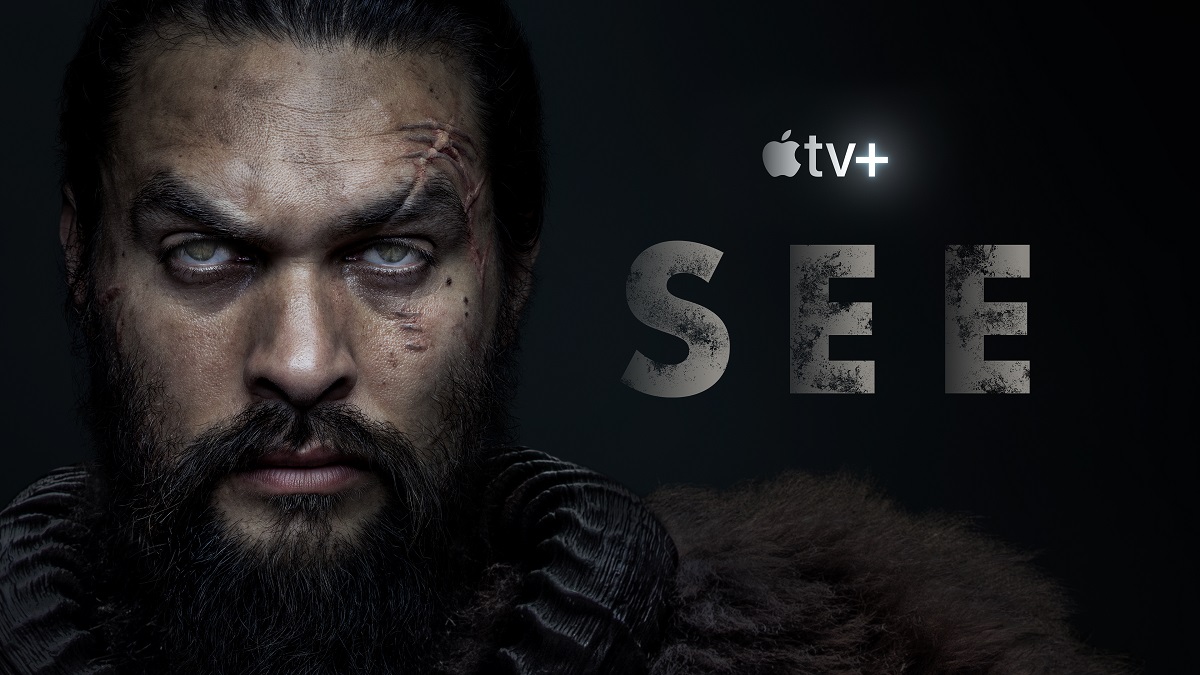We have money. This seems to be the main message behind Apple TV’s launch content as they debut a series of shows with budgets and pedigrees that most basic cable channels can’t come anywhere near. Bringing in Oscar winners, comic book movie stars, and acclaimed creators, Apple isn’t launching their service with what might be called a “ramping-up” period. They’re dropping what they hope will be Peak TV product right from the minute they launch on November 1st, including “Dickinson,” “For All Mankind,” the film “The Elephant Queen,” “The Morning Show,” and the first one we’re reviewing in this week of Apple TV Plus coverage, Steven Knight’s “See.” The creator of “Taboo” and director of “Locke” is back with another project that feels at times like it explores his common theme of masculinity, but this Jason Momoa vehicle takes itself so seriously that it suffocates. After a reasonably interesting premiere, the subsequent episodes suffer from a tone that can’t push through the world-building to give us characters or a story to care about. And it eventually becomes a slog, which is the last thing anybody wants from a streaming service offering.
The three episodes of “See” sent to press were all directed by a man who knows a thing or two about unusual, dystopian world-building: Francis Lawrence, who helmed the films in “The Hunger Games” series after Gary Ross’ departure. Lawrence brings a Hollywood sheen to a very good-looking show that its character would never be able to see. The high concept is that the world ended generations ago, and most of civilization was wiped out. The humans that survived and the offspring they had lost one of their senses: sight. In fact, humanity is so far away from the concept of vision that it’s almost considered an ancient myth like humans remembering Gods with magical powers. As one might imagine, a human race without sight reverted to a more ancient construct, and tribes formed in the woods, developing their own forms of communication.

Lawrence and Knight do a lot with world-building in the first few episodes, capturing how people would relate and even move if everyone was blind. They stage a fun action sequence in the premiere as the Witchfinder General (Christian Camargo) and his soldiers attempt an attack on our hero and his tribe. That hero happens to be Aquaman himself, an effectively charismatic Jason Momoa, playing the unfortunately named Baba Voss here (it’s not that the name is inherently that bad but this is the kind of show in which names are repeated to a bizarre degree and his ends up sounding a little silly). After the action of the premiere, Baba Voss and his newborn children are forced to find a new place to settle and essentially hide from those who seek them, including the malevolent Queen Kane (Sylvia Hoeks from “Blade Runner 2049”). Alfre Woodard co-stars as a wise, respected member of Baba Voss’ tribe.
All of this is interesting stuff until you realize how pretentiously seriously Lawrence, Knight, and everyone involved are taking it. Nothing feels natural. It’s got the unmistakable tone of someone who thinks they’re “doing something important” instead of just crafting a riveting story and allowing the themes to emerge. “See” sometimes feels like a concept and some characters were thrown on a whiteboard but no one figured out how to use them to tell an engaging story. Now, I’ve only seen three of a ten-episode season, but it’s somewhat startling to feel like a project is still in its prologue after spending three hours with it.
A lot of streaming television is criticized for a lack of dramatic urgency—half of Netflix Original shows sag in the middle and could have been a couple episodes shorter—and it’s disheartening to see that Apple TV didn’t learn one key lesson from the failures of other streaming shows. Just because a season can be ten hours long doesn’t mean it should be ten hours long. At least it shouldn’t feel like it’s been ten hours after only three.
Come back to tomorrow for a review of “The Morning Show,” Wednesday for “For All Mankind,” and Thursday for “Dickinson.” The service launches on Friday, 11/1.
Three episodes screened for review.












